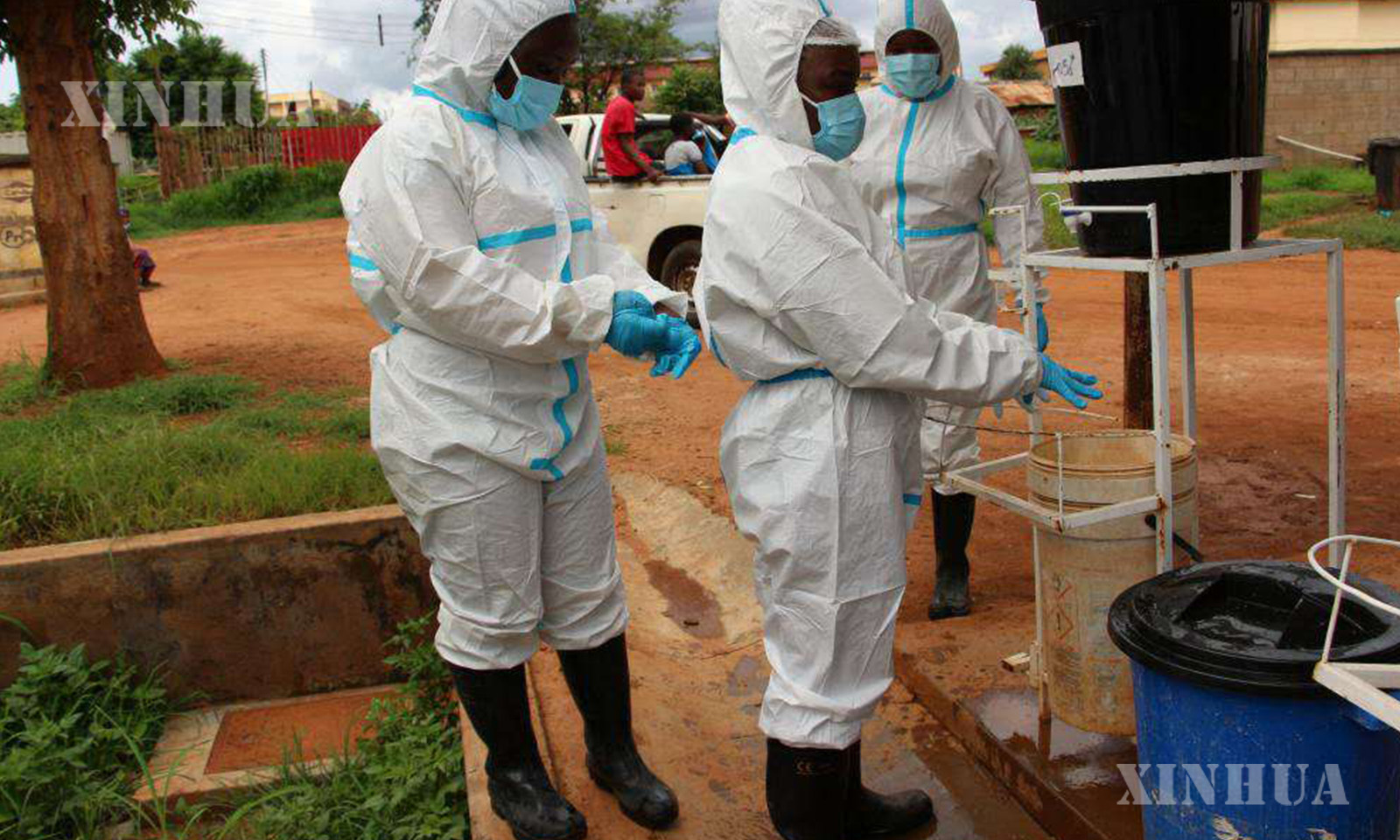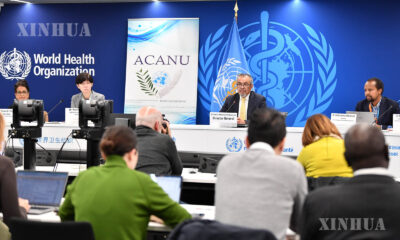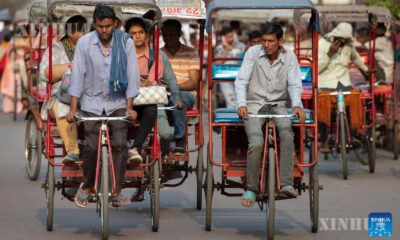International Organizations
ကမ္ဘာလုံးဆိုင်ရာ ကာလဝမ်းရောဂါ ကူးစက်ပျံ့ပွားမှု ဆိုးရွားလာနိုင်ကြောင်းနှင့် လျင်မြန်စွာ တုံ့ပြန်ရန် ကမ္ဘာ့ကျန်းမာရေးအဖွဲ့ချုပ် သတိပေး

ဂျီနီဗာ၊ ဩဂုတ် ၃၀ ရက် (ဆင်ဟွာ)
ကမ္ဘာ့နိုင်ငံပေါင်းများစွာတွင် ပဋိပက္ခနှင့် ဆင်းရဲနွမ်းပါးမှုများကြောင့် ကာလဝမ်းရောဂါ ကူးစက်ပျံ့နှံ့မှု နှုန်း ပိုမိုဆိုးရွားလာကာ ကမ္ဘာလုံးဆိုင်ရာပြည်သူများ၏ ကျန်းမာရေးကဏ္ဍအတွက် သိသာသည့် စိန်ခေါ်မှုတစ်ရပ်ဖြစ်လာကြောင်း ကမ္ဘာ့ကျန်းမာရေးအဖွဲ့ချုပ် (WHO) က ဩဂုတ် ၂၉ ရက်၌ သတိပေး ထုတ်ပြန်ခဲ့သည်။
ကာလဝမ်းရောဂါကူးစက်ပျံ့နှံ့မှုနောက်ဆုံးသတင်းအရ ၂၀၂၅ ခုနှစ် ဇန်နဝါရီ ၁ ရက်မှ ဩဂုတ် ၁၇ ရက် အထိကာလအတွင်း နိုင်ငံပေါင်း ၃၁ နိုင်ငံတွင် ကာလဝမ်းရောဂါ ဖြစ်ပွားသူ ၄၀၉,၀၀၀ ဦးရှိခဲ့ပြီး ၄,၇၃၈ ဦး သေဆုံးခဲ့ကြောင်း၊ နိုင်ငံ ၆ နိုင်ငံမှ အစီရင်ခံစာများအရ သေဆုံးမှုနှုန်းသည် ၁ ရာခိုင်နှုန်းထက် ကျော်လွန်နေကြောင်း သိရသည်။ အချက်အလက်များအရ ကာလဝမ်းရောဂါဖြစ်ပွားမှု အရေအတွက် အများဆုံးမှာ မြေထဲပင်လယ်အရှေ့ပိုင်းဒေသများ ဖြစ်ပြီး သေဆုံးမှုနှုန်းအများဆုံးမှာ အာဖရိက ဒေသဖြစ်ကြောင်း သိရသည်။
ပဋိပက္ခများ၊ အစုလိုက်အပြုံလိုက် ပြောင်းရွှေ့မှုများ၊ သဘာ၀ဘေးအန္တရာယ်များ၊ ရာသီဥတု ပြောင်းလဲခြင်းများက ကာလဝမ်းရောဂါကူးစက်ပျံ့နှံ့မှုကို ဖြစ်ပွားစေခြင်းဖြစ်ကြောင်း WHO က သတိ ပေးထားသည်။ အထူးသဖြင့် အခြေခံအဆောက်အအုံများ နည်းပါးပြီး ကျန်းမာရေးစောင့်ရှောက်မှုများ အကန့်အသတ်သာရှိသည့် ကျေးလက်ဒေသများနှင့် ရေဘေးသင့်ဒေသများတွင် ကာလဝမ်းရောဂါ ကူးစက်ပျံ့နှံ့မှုများ ဖြစ်ပွားကြောင်းလည်း WHO က သတိပေးခဲ့သည်။ အဆိုပါ နယ်စပ်ဖြတ်ကျော် ရောဂါ ကူးစက်မှုများက ရောဂါပျံ့နှံ့မှုများကို ပိုမိုဖြစ်ပွားစေသကဲ့သို့ ရောဂါကူးစက်ပျံနှံ့မှုကို ထိန်းချုပ်ရန် ခက်ခဲ ရှုပ်ထွေးစေကြောင်းလည်း WHO က သတိပေးခဲ့သည်။
သန့်ရှင်းဘေးကင်းသော သောက်သုံးရေ၊ မိလ္လာစနစ်နှင့် တစ်ကိုယ်ရေသန့်ရှင်းမှုရှိခြင်းက လက်ရှိကာလဝမ်းရောဂါ အရေးပေါ်အခြေအနေကို အဆုံးသတ်ရန်၊ နောက်တစ်ကြိမ်ထပ်မံပြန့်ပွားမှုကို တားဆီးရန် တစ်ခုတည်းသော ရေရှည်တည့်တံ့သည့် ဖြေရှင်းချက်ဖြစ်ကြောင်း WHO က အလေးအနက် ထား ထုတ်ပြန်ခဲ့သည်။ ရောဂါဖြစ်ပွားမှုအတိုင်းအတာ၊ ပြင်းထန်မှုနှင့် အပြန်အလှန်နှီးနွှယ်မှု သဘောသဘာ၀များအရ နိုင်ငံအတွင်းနှင့် နိုင်ငံများစွာတွင် ကာလဝမ်းရောဂါ ထပ်မံကူးစက်ပျံပွားနိုင်ခြေအလွန်မြင့်မားနေကြောင်းလည်း WHO ၏ သုံးသပ်ချက်အရ သိရသည်။
ရောဂါကူးစက်မှုပြန့်ပွားနေခြင်းကို တားဆီးနိုင်ရန် စောင့်ကြည့်မှုများ ပိုမိုပြုလုပ်ခြင်း၊ စီမံခန့်ခွဲမှုများ တိုးမြှင့်လုပ်ဆောင်ခြင်း၊ ပိုမိုသန့်ရှင်းသောရေကို ရရှိစေခြင်း၊ မိလ္လာစနစ်နှင့် တစ်ကိုယ်ရေသန့်ရှင်းမှုများ ဆောင်ရွက်ရန်တိုက်တွန်းခြင်း၊ ကာကွယ်ဆေးထိုးနှံခြင်းအစီအစဉ်များလှုံ့ဆော်ရန်၊ ပြည်သူ့ ကျန်းမာရေးအစီအမံများ အကောင်အထည်ဖော်နိုင်ရေးအတွက် နယ်စပ်ဖြတ်ကျော် ပူးပေါင်းဆောင်ရွက်မှုများ တိုးမြှင့်လုပ်ဆောင်သွားကြရန် WHO က တိုက်တွန်းထားကြောင်း သိရသည်။ (Xinhua)
……………………..
(English Version)
WHO warns of worsening global cholera outbreaks, urging swift response
GENEVA, Aug. 29 (Xinhua) — The World Health Organization (WHO) reported on Friday that cholera outbreaks, driven by conflict and poverty, are worsening across multiple countries and pose a significant global public health challenge.
The latest Disease Outbreak News said that 409,000 cholera cases and 4,738 deaths were reported across 31 countries between Jan. 1 and Aug. 17 2025, with six countries reporting case fatality rate exceeding 1 percent.
According to the data, the Eastern Mediterranean Region registered the highest number of cases, while the African Region reported the most deaths.
The report warns that conflict, mass displacement, natural disasters, and climate change are driving the spread of cholera, particularly in rural and flood-affected areas with weak infrastructure and limited healthcare access. These cross-border challenges have made outbreaks increasingly complex and difficult to contain.
WHO stresses that access to safe drinking water, sanitation, and hygiene remains the only sustainable long-term solution to end the current cholera emergency and prevent future ones. Given the scale, severity, and interconnected nature of the outbreaks, the risk of further spread both within and across countries is assessed as very high.
To curb transmission, WHO recommends strengthening surveillance, improving case management, scaling up Water, Sanitation, and Hygiene (WASH) interventions, conducting vaccination campaigns, and enhancing cross-border coordination to implement public health measures.
Photo:
Environmental officers disinfect themselves after disinfecting a body at Bwaila hospital in Lilongwe, Malawi, Jan. 17, 2023. (Photo by Roy Nkosi/Xinhua)






